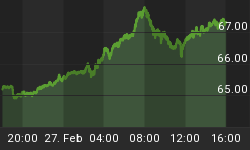Below is an excerpt from a commentary originally posted at www.speculative-investor.com on 27th June, 2010.
According to a recent article by Ambrose Evans-Pritchard, "Federal Reserve chairman Ben Bernanke is waging an epochal battle behind the scenes for control of US monetary policy, struggling to overcome resistance from regional Fed hawks for further possible stimulus to prevent a deflationary spiral." The article goes on to explain that with the economy rolling over the Fed should be prepared to quickly inject a massive amount of new money, and that pig-headed resistance to more monetary inflation by a few Fed governors poses a serious threat. However, nowhere in the article is there a logical explanation of how counterfeiting more money would benefit the economy. This could be because such an explanation doesn't exist.
Despite being a well-respected commentator on economics and the financial markets, Evans-Pritchard's understanding of economics leaves a lot to be desired (to put it mildly). He perceives falling prices as the major threat facing the US economy and is therefore an advocate of doing whatever it takes to arrest widespread price declines, but fails to realise that falling prices are just a symptom and that the 'solutions' recommended by him and his beloved Bernanke will increase the severity of the disease.
If you increase the money supply by enough then you can surely get most prices to rise, but only at the cost of general impoverishment. This is because monetary inflation distorts the price signals upon which the economy relies, thus leading to the wastage of resources and the destruction of wealth.
When it comes to understanding the world of economics, one of the problems is that the link between cause (the policy) and effect is sometimes so long and indirect that it will only be evident to the people who had a good understanding of economic theory to begin with. This is certainly the case with monetary inflation, which sometimes gives a short-term boost to markets and economies while it weakens the economy's foundations. The difficulty of 'seeing' the link between cause and effect is why so many people are able to claim, with straight faces, that more monetary and/or fiscal stimulus is needed to address an economic downturn that was caused by earlier rounds of monetary and/or fiscal stimulus.
It can take years for the problems caused by monetary inflation to ripple through the economy, but the adverse effects of some other "stimulus" measures have shorter lead times. For example, when the government directly pays people to buy things they otherwise wouldn't have bought, there will tend to be a short-lived boost followed by a plunge. Something along these lines has occurred in the US residential property market over the past year. With house prices having been propped up by government incentives and with considerable demand having been sucked from the future, the US housing market is now in a weaker position than it was 12 months ago. So, it must be time for more stimulus, right?
It should always be kept in mind that "stimulus" of any kind is a zero-sum game AT BEST. This is because the government doesn't generate any wealth of its own; it just redistributes existing wealth. In reality, "stimulus" is always a negative-sum game because the process of redistribution always results in the less efficient use of resources.
In conclusion, the world of economic policy-making tends to operate as follows: bad policies beget problems, which beget more bad policy responses, which beget even bigger problems, and so on. The major threat facing us is therefore not a deflationary spiral, as asserted by Evans-Pritchard et al; it's a bad-policy spiral.
Interesting quote of the week
In the following quote from Chapter 24 of "The Ethics of Liberty", Murray Rothbard argues that it is immoral to invest in government bonds.
"Many libertarians assert that the government is morally bound to pay its debts, and that therefore default or repudiation must be avoided. The problem here is that these libertarians are analogizing from the perfectly proper thesis that private persons or institutions should keep their contracts and pay their debts. But government has no money of its own, and payment of its debt means that the taxpayers are further coerced into paying bondholders. Such coercion can never be licit from the libertarian point of view. For not only does increased taxation mean increased coercion and aggression against private property, but the seemingly innocent bondholder appears in a very different light when we consider that the purchase of a government bond is simply making an investment in the future loot from the robbery of taxation. As an eager investor in future robbery, then, the bondholder appears in a very different moral light from what is usually assumed."
We aren't offering a free trial subscription at this time, but free samples of our work (excerpts from our regular commentaries) can be viewed at: http://www.speculative-investor.com/new/freesamples.html.















